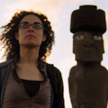I’m a Scientist is like school science lessons meet the X Factor! School students choose which scientist gets a prize of $1000 to communicate their work.
Scientists and students talk on this website. They both break down barriers, have fun and learn. But only the students get to vote.
This zone is the Organs Zone. It has scientists studying health and disease in various parts of our bodies. Who gets the prize? YOU decide!









That’s a very tough question, johnfowla!
Do you mean the toughest area for me to understand, or what i think the most difficult area to solve problems in?
I will answer both. I find physics very difficult, especially the kind called “theoretical physics” where they just think about the science, and don’t have the right tools to test it. I think it would be very hard to have lots of ideas (theories) about science and have to do lots of mathematics and not be able to test anything. And i find this kind of science very difficult to understand.
I think cancer biology is a very difficult area of science to find good answers in. It’s hard, because there is a lot of pressure because everyone knows someone with cancer, but all kinds of cancer are different, so it feels like the science is moving very slowly. But in fact, cancer researchers are working very hard.
I think many fields of science are difficult to study, especially when you don’t have the right tools for the job!
1
It’s gotta be neuroscience! LOL
I was never good at it to be honest! But then again, it’s different for everyone. Some are just good at understanding certain things.
For example, my brother works in physics. I wouldn’t be able to tell you half of the things he does, because i know nothing about that field. So I see it as hard…
Hope that makes sense 😀
0
Geology! (Get it? Rocks…hard….) 🙂
2
All fields of science have hard questions (some more than others!) – this also means that we need the right people to work at finding answers to these questions.
Shortlist of fields of hard science:
– cure illnesses (from cancer, heart disease, degenerative neurological disorders) is definitely important.
– cybernetics/creating robot-human organisms
– creating food without harming animals
– engineering and creating cities in the sky/underwater/different planets
– travelling to distant stars
There are actually too many hard areas but who know what the future will hold for us to be abel to understand?
0
I met an astrophysicist who has a job in finding the first stars in the universe. I was so stumped that I couldn’t even form a question! For me, physics is difficult because you often can’t see what you’re researching – a lot of it is theory, rather than reactions in test tubes.
Studying the brain is pretty difficult too. We hardly know anything about it. If we were to understand it more, maybe we’d have flow along effects to physics too!
0